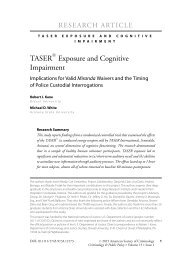1qaSADJ
1qaSADJ
1qaSADJ
Create successful ePaper yourself
Turn your PDF publications into a flip-book with our unique Google optimized e-Paper software.
Special Focus:<br />
Writing Persuasively<br />
The discussion then moved to the topic of revision. Every group generated their longest<br />
list of suggestions as conversation about revision ensued. Aside from the usual jokes,<br />
the revision suggestions were cogent. While each group noted that the essay needed to<br />
focus more on articulating an argument than crafting a story, there were many viable<br />
suggestions for redeeming an essay that had missed its mark. Several students noted that<br />
the final sentence of the first paragraph—“The Morgan horse, America’s first original<br />
breed of horse, is bred to be a great athelete [sic], and bloodlines are carefully analyed<br />
[sic] to insure the best possible offspring”—actually sets up the issue; it just needs some<br />
recrafting. Other suggestions for revisions included:<br />
• Shift the essay to focus on the issue of honesty and the verification of bloodlines<br />
(the solution could be a form of sophisticated testing).<br />
• Focus on the issue of owners as victims of false breeding information.<br />
• Because the breeder lied, there is a possibility for developing an argument<br />
about ethics.<br />
• The writer could have used this topic/example as a means of exploring the<br />
integrity of organized horse racing.<br />
• Whose responsibility is it to know the veracity of the breed? Who is to blame?<br />
Should the association be sued?<br />
• Consider this as an example of the greater issue: honor in today’s world.<br />
• Provide more concise and focused background information in the<br />
first paragraph.<br />
• Focus more on opposing arguments than on narrative in the introduction.<br />
• Conclude by voicing opinion, compromise, and solution.<br />
As we concluded our discussion of the essay, the sensitivity of the students toward<br />
an unfortunate writing sample as well as toward the process of crafting and revising<br />
became more evident. One student remarked that he remembered “feeling pretty good<br />
about that question” after completing the 2004 AP English Language Examination<br />
but now wondered how he really had done. That this exercise in revision ended with<br />
thoughtful consideration was affirming. So often exercises in revision that are not oneon-one<br />
conferences focused directly on a student’s draft are exercises in frustration—for<br />
the teacher who is troubled by her students’ certainty that those obvious problems in<br />
someone else’s work would never occur in their own, and for the students who are<br />
disengaged from the revisionary processes.<br />
Why did the exercise work? AP students are competitive and are generally interested<br />
in ways to improve their reading and writing. However, in this instance, ironically the<br />
strength of the unsuccessful student’s voice (it did, after all, engage a class of busy,<br />
AP® English Language and Composition: 2006–2007 Workshop Materials 21



